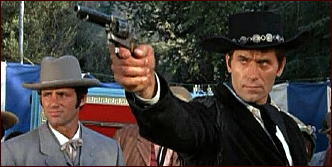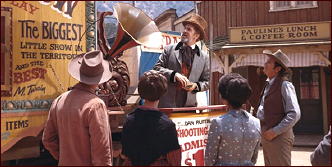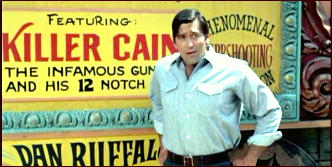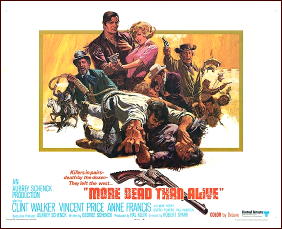Thu 4 Feb 2016
A Western Movie Review by Dan Stumpf: MORE DEAD THAN ALIVE (1969).
Posted by Steve under Reviews , Western movies[5] Comments

MORE DEAD THAN ALIVE. United Artists, 1969. Clint Walker, Vincent Price, Anne Francis, Paul Hampton, Craig Littler, Mike Henry. Written by George Schenck. Directed by Robert Sparr.
In the wisdom of my advancing years I find myself wondering more and more where films like this come from. At the tail end of the “Spaghetti Western†cycle this film appears, written and directed by talents completely undistinguished, yet brought off with style and imagination, carried through by a well-used cast.
Perhaps I should have said “almost completely undistinguished;†the cinematographer here was Jack Marquette, who worked in the B-movie sub-basement back in its 50s/60s hey-day, with films like Attack of the 50 Foot Woman and Creature from.jpg the Haunted Sea to his credit, and he does serviceable work here. But to get back to the Movie, as they say:

Clint Walker stars as Cain (aka:“Killer Cainâ€) a notorious gunman with twelve notches on his pistol, released from Prison after an 18-year stretch… possibly for thwarting bad-guy Mike Henry’s effort to spring his brother from jail in a bloody but abortive break-out attempt.
At any rate, Cain finds himself at loose ends in a society that has moved past him, much like the aging lawmen in Ride the High Country, periodically tormented by the sadistic Mike Henry and unable to find a steady job because of his reputation. Like Randolph Scott in Country, he settles uncomfortably into employment in a shabby Wild West show run by Vincent Price (a marvelous performance) where his notoriety brings him dubious stardom.

It also brings him into conflict with the show’s former star (Paul Hampton, of whom more later) a superior gun-artist now reduced to supporting-player status. The movie becomes an interesting study of the three-way relationship between Walker, Price and Hampton, with Walker’s easy assurance matched perfectly by Price’s show-biz savvy while Hampton knocks himself out on the sidelines like a moth batting into a light bulb, torn between jealousy and hero-worship.
Writer Schenck also throws in Anne Francis, every bit as bewitching as she was back when she sported about on the Forbidden Planet, and Craig Littler as a good-humored young attorney dogging Walker’s footsteps like a benevolent counterpart to Mike Henry’s outlaw. Things run to a surprise finish after a satisfying set-to between Walker and Henry—two screen antagonists who seem perfectly matched against each other.

But I should put in a word here about Paul Hampton as the would-be gunslinger: his performance has come in for a lot of ridicule — I particularly like the reviewer who called him the Ultimate Method Actor — but I find his playing energetic and daring. Equal parts James Dean and Leo Gorcey, he agitates, cries, and visibly deflates as the part requires, and his scene with Mike Henry is incredibly visceral.
One thing puzzles me, though: according to Wikipedia, Paul Hampton is a highly-regarded singer and composer, but the only actual credit I can find for him is as the writer/performer of My Mother the Car. So either I’m missing something important or it’s pretty easy to be “highly regarded†in the Music Industry.
Hey, maybe I should give it a try….

e
February 5th, 2016 at 12:28 am
Anne Francis and Vincent Price in the same movie? I have to see this one.
PS. Dan, don’t give up your day job.
February 5th, 2016 at 11:57 am
Robert Sparr directed many good episodes of LAWMAN in 1960, and some decent ones for CHEYENNE with Clint Walker in 1962. You can search his name in my list of favorite TV shows:
http://mikegrost.com/c70.htm
The LAWMAN episode TO CAPTURE THE WEST is one of the best ever made in a TV Western. It is a low key, beautiful look at a painter out West.
Several Sparr works have Old West show biz backgrounds – like this movie reviewed.
February 5th, 2016 at 3:09 pm
Have to find this. Don’t know how I missed it.
Is that Jack Elam listening to Price spiel in one of the pictures? Let me guess, one of Henry’s henchmen?
February 5th, 2016 at 8:36 pm
Walker co stars with Roger Moore plus Robert Middleton and Keenan Wynn in a favorite little Western of mine, GUNS OF THE SEVEN SAINTS, a sort of Indiana Jonish affair based on a story or novel by Steve Frazee and with a screenplay by Leigh Brackett. It’s plays as a sort of low key TREASURE OF SIERRA MADRE spoof with everyone’s tongue slightly in cheek and some good action as well.
February 5th, 2016 at 9:33 pm
David,
GOLD/SAINTS is a favorite of mine,with typically punchy direction by Gordon Douglas.
And no, that’s not Jack Elam in MORE DEAD… but Emile Meyer has a small part as a bartender.